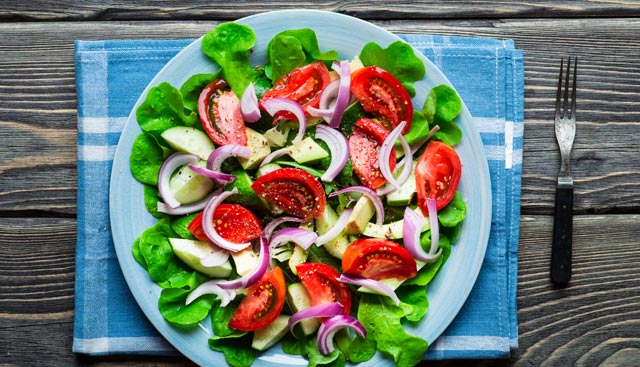
7 Tips To Stay on a Healthy Track During the Holidays
By Amber Orman, MD
Moffitt Cancer Center
1. What is the number one tip you give people to start eating healthier?
Eat more plants!
2. What is one food that is commonly tagged as "healthy" that you think people should avoid?
"Energy drinks." They contain various amounts of caffeine, sugar, artificial sweeteners, herbal supplements, vitamins, and preservatives, with little regulation in terms of labeling. They are under increasing scrutiny as evidence accumulates linking them to adverse cardiovascular events, sleep disturbances, and other substance abuse among adolescents.
A healthier, more sustainable energy can be gained from quality sleep, exercise, and balanced nutrition.
3. We often hear that people should "eat their colors." Is there a correlation between certain colors of foods and certain types of cancer/health benefits?
Red fruits and vegetables are often high in the antioxidants lycopene and anthocyanins; think berries, tomatoes, watermelon, red cabbage, cherries, beets, and kidney beans.
Orange and yellow fruits and vegetables are rich in beta-carotene, which is converted to vitamin A in your body, as well as folate. Vitamin A is important for eye, skin, teeth, and bone health. Folate is a key factor in the synthesis and repair of DNA, and is vital for women trying to conceive.
Green vegetables are rich in vitamin K, which is needed for blood clotting. They also contain the antioxidant vitamins C and E, and the phytonutrients lutein and zeaxanthin, which can lower the risk of chronic diseases.
Blue and purple fruits and vegetables contain antioxidants in the form of anthocyanins, as well as flavonoids and ellagic acid which have anti-cancer and anti-inflammatory properties.
White fruits and vegetables are often high in fiber, which can lower cholesterol, as well as anti-oxidant rich flavonoids such as quercetin.
4. How long does it take to reverse the adverse effects of an unhealthy diets/see the benefits of eating better?
It really depends on the health status of the individual person, as well as the amount of effort being put into positive lifestyle change. Plant-based diets have numerous benefits, both in the short term and long term. Within a very short time, one may notice improvements in energy, mood, sleep, and skin appearance. In the long term, a plant-based diet can prevent many chronic diseases and cancers, cure chronic disease (think diabetes, hypertension, etc), and decrease the risk of recurrence in those who have already gone through cancer treatment.
5. What is the worst holiday food offender that you commonly see at seasonal parties?
Some of the traditional holiday desserts can be nearly completely devoid of nutritional value. Combinations of condensed milk, eggs, butter, corn syrup, and sugar, which are marketed as "food," result in immediate gratification, followed by a cascade of events throughout your body, leaving you regretful, yet craving more. This cycle may repeat itself multiple times throughout the holiday season, leaving you with guilt-motivated resolutions on Jan. 1. Rather than subject yourself to this, bring along a dish or two so that you know you have options during each event.
6. For people trying to eat healthy at holiday parties where they cannot bring a dish to pass, what are a few go-to healthier options to help them stay on track over the holiday season?
I would recommend eating a small meal beforehand, so as to not arrive ravenous. Stick to vegetable crudité with hummus, roasted vegetables, green salads (use olive oil and vinegar as a dressing), and fruit-based desserts.
7. Is there one health food powerhouse that is easy to incorporate (noticed or unnoticed) into everyday meals?
Hemp seeds are an excellent source of protein, essential fatty acids (they contain six times more omega 3 than raw tuna), amino acids, trace minerals, and dietary fiber. They can be sprinkled on or incorporated into just about anything as they are tiny, with a very mild flavor and pleasant texture.
Radiation oncologist Dr. Amber Orman’s clinical focus is breast cancer with an emphasis on holistic care that encompasses both mind and body.
